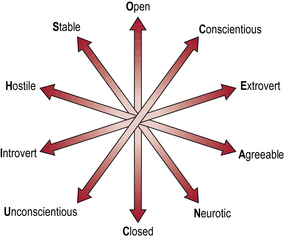Chapter 10 Personality and health
We can see similarities in how people act as well as clear differences. Scientists have been describing these similarities and differences for centuries and the concept of personality is an important part of current psychological research. Reliable measures of personality have been found to predict performance and health. Such research has important applications. For example, many businesses now use personality profiling as part of their selection procedures so that they can employ people who have predictable social skills and behaviour patterns. Similarly, if someone behaves out of character, we should look for causes that might be related to health, such as drug abuse, the onset of dementia or a breakdown in a relationship.
Below we focus on some of the implications of research into personality for health and health care.
Traits
Much recent research on personality has focused on five broad personality traits: openness to experience (or intellect), conscientiousness, extroversion, agreeableness, neuroticism (also referred to as emotional stability and negative affect) (Fig. 1). This group of five traits is known as the big five or OCEAN model of personality and research indicates that the big five traits may determine the extent to which people engage in general clusters of health-related behaviours like substance
use risk behaviours such as smoking (Booth-Kewley & Vickers, 1994).

 Does personality change over time? Are these changes in underlying personality or changes in how people learn to cope with familiar situations?
Does personality change over time? Are these changes in underlying personality or changes in how people learn to cope with familiar situations?


